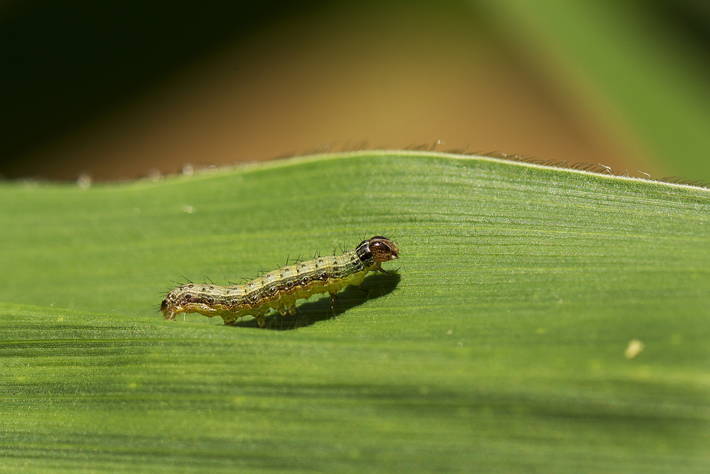Supporting the Management of Fall Armyworm in Africa and Asia: Best Practices and Lessons Learned

Fall Armyworm (FAW) is an invasive and damaging pest endemic to the Americas that is spreading across Africa and Asia, particularly targeting maize, a vital staple crop. FAW will have long-term effects on crop yields, food supplies, livelihoods, trade, and threaten the resilience of chronically vulnerable populations.
In this webinar, participants hear expert presentations that highlight important research and dissemination tools developed by the United States Agency for International Development (USAID) and its partners to support the management of FAW by smallholder farmers and local plant protection offices. Panelists reflect on the success of response interventions to date and capture key learning that enables us to better respond to similar pest and disease outbreaks in the future.
Attendees of this webinar have an opportunity to get an up-close look at each resource, understand the unique information contained within, and to ask questions of the experts who developed them. The webinar is useful for both technical and non-technical individuals who want to understand how to influence farmer pest management behavior. The event synthesizes lessons learned and best practices organized around three thematic areas:
1. Identifying and Validating Technologies
2. Policy and Enabling Environment
3. Knowledge Transfer and Communications
COVER PHOTO CREDIT:
FAO
Robert Bertram
Chief Scientist, USAID Bureau for Resilience and Food Security
Rob Bertram is the Chief Scientist in USAID’s Bureau for Resilience and Food Security, where he serves as a key adviser on a range of technical and program issues to advance global food security and nutrition. In this role, he leads USAID’s evidence-based efforts to advance research, technology and implementation in support of the U.S. Government’s global hunger and food security initiative, Feed the Future. He previously served as Director of the Office of Agricultural Research and Policy in the Bureau for Resilience and Food Security, which leads implementation of the Feed the Future research strategy and related efforts to scale innovations in global food security efforts, working with a range of partners. Prior to that, he guided USAID investments in agriculture and natural resources research for many years. Dr. Bertram’s academic background in plant breeding and genetics includes degrees from University of California, Davis, the University of Minnesota and the University of Maryland. He also studied international affairs at Georgetown University and was a visiting scientist at Washington University in St. Louis. He has been especially active in plant genetic resources policy as it relates to research for development, including applications of biotechnology in food security-related research. Before coming to USAID, he served with USDA’s international programs as well as overseas with the Consultative Group on International Agricultural Research (CGIAR) system.
Joe Huesing
Independent Consultant, Huesing Agricultural and Educational Consulting LLC (HAEC)
Joe Huesing is an independent consulting entomologist, educator and Fall Armyworm IPM advisor. Currently he works in the area of assessing, designing and implementing IPM approaches for control of the FAW.
Sarah Page
Technical Advisor for Sustainable Livelihoods and Landscapes , Catholic Relief Services
Sarah Page is a Technical Advisor for Sustainable Livelihoods and Landscapes with Catholic Relief Services. Based in Baltimore, Sarah supports global programming at the nexus of inclusive value chains, natural resource management and land restoration. She also contributes to the agency’s research and learning efforts around farmer communications, capacity building, and farmer organizational strengthening. She’s worked with smallholder coffee, horticulture and basic grains farmers in East Africa, Latin America and the United States.
Paul Jepson
Director, Integrated Plant Protection Center, Oregon State University
Dr. Paul Jepson, director, Integrated Plant Protection Center, Oregon State University provides expertise on pesticide impacts on beneficials and other non-target organisms and supervises the information technology experts who design and maintain the online interface. Paul’s research interests in IPM include the study of pest and natural enemy population dynamics in agricultural systems and have focused particularly on pesticide management and side effects, biological pest control and the development of ecological risk assessment for beneficial invertebrates.
Dan McGrath
Professor Emeritus, Oregon State University
Dan McGrath, Professor Emeritus Oregon State University, worked for three decades in Oregon’s Willamette Valley where he conducted applied research and Extension programs in vegetable production, integrated pest management, and sustainable agriculture. He served as Linn County Staff Chair for fourteen years. Since his retirement in 2016, Dr. McGrath has worked across sub Saharan Africa and Asia, helping smallholder farmers to manage Fall Armyworm in maize using an integrated pest management approach.
Boddupalli Maruthi Prasanna
Director of Global Maize Program, The International Maize and Wheat Improvement Center
Dr B.M. Prasanna is the Director of CIMMYT’s Global Maize Program and CGIAR Research Program MAIZE. Based in Nairobi, Kenya, Prasanna has been leading CIMMYT-led multiinstitutional efforts in fighting the challenges of devastating transboundary diseases and insect-pests on maize, including the Fall Armyworm.